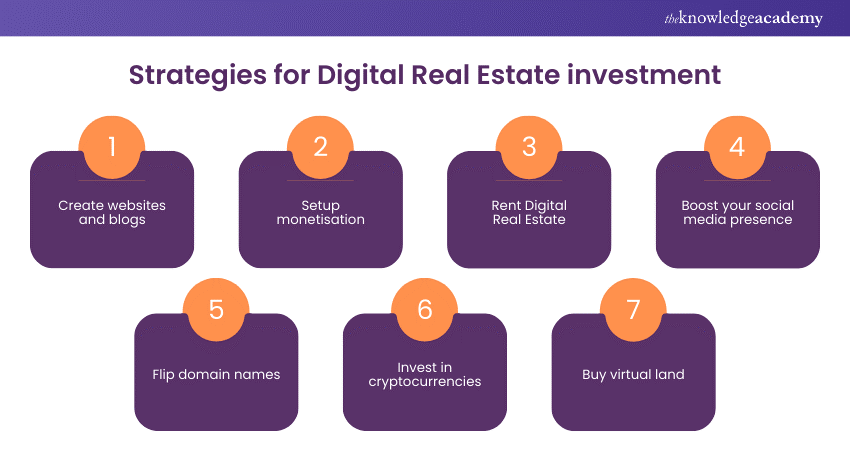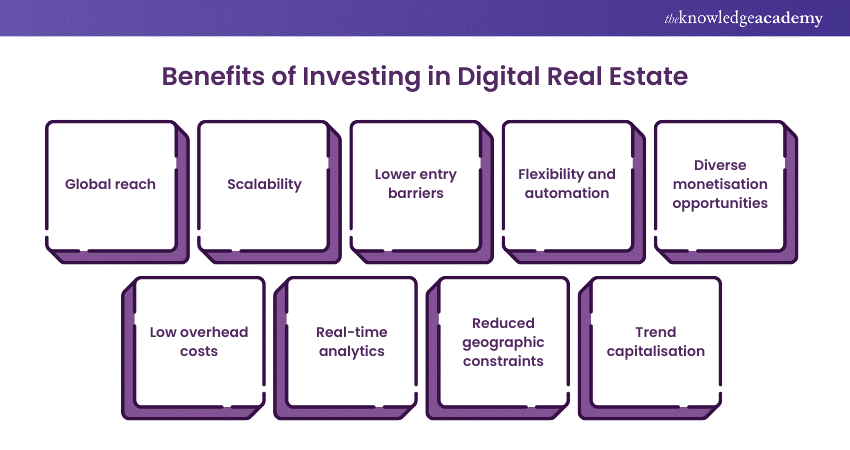We may not have the course you’re looking for. If you enquire or give us a call on 01344203999 and speak to our training experts, we may still be able to help with your training requirements.
We ensure quality, budget-alignment, and timely delivery by our expert instructors.

Understanding How to Invest in Digital Real Estate opens exciting opportunities in the online world. Just like you'd explore Real Estate in the physical world, understanding the basics and following a few strategies can set you on the way to success in the digital world.
If you are interested in learning more about these strategies, then this blog is for you. In this blog, you will learn what Digital Real Estate is and How to Invest in Digital Real Estate with effective strategies. Let’s dive in!
Table of Contents
1) What is Digital Real Estate?
2) Strategies for Digital Real Estate Investment
a) Creating websites and blogs
b) Monetisation setup
c) Renting Digital Real Estate
d) Social media presence
e) Flip domain names
f) Investing in Cryptocurrency
g) Buy virtual land
3) Benefits of Investing in Digital Real Estate
4) Conclusion
What is Digital Real Estate?
Digital Real Estate refers to valuable assets that exist in the online world. These assets have value and can be owned, bought, sold, and developed, much like physical properties. These assets include the following:
a) Domain names: These are addresses for websites on the internet, like "www.example.com.”
b) Websites and online businesses: Online platforms that provide information, services, or products to users.
c) Social media accounts: Personal or business profiles on social media platforms.
d) Digital content: Various forms of content such as articles, videos, images, and other media that people consume online.
Investing in Digital Real Estate means acquiring and managing these online assets to make them valuable and potentially generate income. Similar to traditional Real Estate, the value of these digital assets can increase through strategies like optimisation, marketing, and providing content or services to users.
Strategies for Digital Real Estate Investment
Investing in Digital Real Estate requires a well-thought-out strategy to maximise returns and mitigate risks. Let’s explore How to Invest in Digital Real Estate with some effective strategies:

1) Creating websites and blogs
Building and managing successful websites and blogs offer an excellent opportunity to invest in the Digital Real Estate market. Generating income from your online platform can be achieved through advertising, affiliate marketing, and sponsorships.
Alternatively, you can purchase an existing website or blog and further develop it to yield capital gains. This approach is highly favoured for Investing in Digital Real Estate due to its accessibility and potential for substantial returns. Understanding how to construct and manage a website or blog is quite simple, and the Return on Investment (ROI) can be quite lucrative.
Besides, the initial investment is minimal, and you can dedicate your spare time to the work. Once your website or blog has attracted a sizable audience, you can sell it at a profit, exceeding your initial investment.
Moreover, websites and blogs can help you generate passive income through various revenue streams like advertising, affiliate marketing, and sponsored content. This provides a consistent income without the requirement for continuous site supervision, making it an attractive option for individuals seeking passive income streams.
Additionally, there is the potential for substantial long-term growth as your website or blog accumulates a devoted audience, which can enhance its value. Potential purchasers might be willing to pay more for a site that has a well-established viewership.
2) Monetisation setup
Select a monetisation model that suits your digital assets. This could involve adding affiliate marketing links, showing relevant ads, enabling e-commerce features, or providing subscription-based services. The monetisation model should match the user experience and goal of your asset.
3) Renting Digital Real Estate
One of the main advantages of Real Estate is you can generate income without having to sell it. . The same is true for Digital Real Estate. Rather than selling your asset outright, renting out your Digital Real Estate can help generate a steady stream of income and profit from potential increases in its value over time. Let's explore how you can do that:
a) Website space: Rent out space on your website to advertisers or businesses looking to promote their products or services.
b) Selling digital ad space: Offer digital advertising slots on your online platforms for brands to reach your audience.
c) Leasing virtual land: Explore opportunities in online virtual worlds to lease land for various purposes, such as virtual businesses or events.
4) Social media presence
Establish a presence on social media platforms. Create profiles and share content that resonates with your audience. Engage with your followers, react to comments, and use social media to drive traffic to your digital assets.
5) Flip domain names
Domain names can have value if you can identify the right choices. Seek out domain names that businesses can brand easily, are concise and memorable, and get the .com extension. This can result in the best potential returns over time.
However, similar to renovating and selling homes, domain name flipping carries risks. It's crucial to understand what will sell and what won't. You might purchase a dud and make no profit, or you could acquire an excellent name and sell it for a substantial profit.
6) Investing in Cryptocurrency
When learning How to Invest in Digital Real Estate, you can begin by investing in Cryptocurrency. Cryptocurrencies like Bitcoin, Ethereum, and Litecoin are decentralised digital currencies that function without central bank control. Unlike traditional currencies supported by government guarantees, cryptocurrencies rely on intricate algorithms and cryptographic techniques.
This means that investing in Cryptocurrencies is a way to acquire and hold digital assets, similar to how one might invest in physical Real Estate properties. Cryptocurrencies offer the potential for appreciation in value and can be a part of your Digital Real Estate investment strategy.
7) Buy virtual land
For an investment resembling physical Real Estate, consider purchasing virtual land in the Metaverse. Platforms like Decentraland offer opportunities for Digital Real Estate investments, but alternatives exist as well.
All Digital Real Estate transactions are securely recorded on the Ethereum blockchain, preventing any duplication of Real Estate holdings. A blockchain serves as a public database shared among numerous computers in a network.
Learn how to mitigate Real Estate risks effectively with our comprehensive Real Estate Risk Management Training – sign up now!
Benefits of Investing in Digital Real Estate
Investing in Digital Real Estate offers several compelling benefits. This makes it an ideal choice for diversifying investments and capitalising on the expanding online economy. Let’s explore some benefits of investing in Digital Real Estate:

1) Global reach: Unlike physical Real Estate, digital assets have a worldwide audience. A well-established website or online business can attract visitors from around the globe, opening doors to a vast and diverse market.
2) Scalability: Digital assets are highly scalable. They can be expanded and optimised with relative ease, empowering investors to grow their online presence without the constraints of physical resources.
3) Lower entry barriers: Traditional Real Estate often demands substantial capital for property acquisition. In contrast, Digital Real Estate boasts a lower entry barrier. Domain names, websites, and online businesses are often obtainable at a fraction of the cost of physical properties, making them accessible to a broader range of investors.
4) Flexibility and automation: Many aspects of Digital Real Estate can be automated. From online sales to content distribution, automation tools enable investors to generate passive income streams, reducing the need for constant hands-on management.
5) Diverse monetisation opportunities: Digital assets can be monetised through various means, including affiliate marketing, advertising revenue, subscription models, e-commerce sales, and more. This diversity of income sources offers investors flexibility and the potential for multiple revenue streams.
6) Low overhead costs: Operating and maintaining digital assets typically entail lower overhead costs compared to physical properties. There's no need for physical maintenance, property taxes, or utility bills, potentially resulting in higher profit margins.
7) Real-time analytics: The digital landscape provides real-time analytics, empowering investors to collect data on user behaviour, engagement, and performance. This data-driven approach facilitates informed decision-making and optimisation strategies.
8) Reduced geographic constraints: Physical Real Estate ties investors to specific locations, which may not always be ideal. Digital Real Estate transcends geographic limitations, granting investors the freedom to operate from anywhere while reaching a global audience.
9) Trend capitalisation: With the world increasingly embracing digital interactions, the value of Digital Real Estate is poised to rise. Investing now allows individuals to capitalise on this trend and potentially benefit from long-term growth.
Elevate your investment skills with our Investment and Trading Training!
Conclusion
We hope you read and understand How to Invest in Digital Real Estate. Just like any investment, you need to work hard, be patient, and be ready to learn and change. By using the steps, we talked about, you can discover new investment chances and use online stuff to build a successful collection of investments.
Enhance your investment prowess with our Real Estate Financial Modelling Training – sign up now!
Frequently Asked Questions

Digital Real Estate offers career flexibility by allowing individuals to generate income from anywhere with an internet connection. Whether you're a Blogger, E-commerce Entrepreneur, or Cryptocurrency Investor, you can manage your digital assets remotely, giving you the freedom to work from various locations and adapt to changing life circumstances.

Emerging trends in Digital Real Estate include increased interest in virtual Real Estate within Metaverse platforms, the growth of Non-Fungible Tokens (NFTs) related to digital assets, and the integration of blockchain technology for enhanced security and transparency. Additionally, niche-specific websites and content monetisation continue to be popular avenues for investment and income generation.

The Knowledge Academy takes global learning to new heights, offering over 30,000 online courses across 490+ locations in 220 countries. This expansive reach ensures accessibility and convenience for learners worldwide.
Alongside our diverse Online Course Catalogue, encompassing 17 major categories, we go the extra mile by providing a plethora of free educational Online Resources like News updates, Blogs, videos, webinars, and interview questions. By tailoring learning experiences further, professionals can maximise value with customisable Course Bundles of TKA.

The Knowledge Academy’s Knowledge Pass, a prepaid voucher, adds another layer of flexibility, allowing course bookings over a 12-month period. Join us on a journey where education knows no bounds.

The Knowledge Academy offers various Investment and Trading Courses, including Real Estate Risk Management Training, Real Estate Financial Modelling Training etc. These courses cater to different skill levels, providing comprehensive insights into Investment and Trading methodologies.
Our Business Skills blogs cover a range of topics related to Real Estate, offering valuable resources, best practices, and industry insights. Whether you are a beginner or looking to advance your Business skills, The Knowledge Academy's diverse courses and informative blogs have you covered.
Upcoming Business Skills Resources Batches & Dates
Date
 Real Estate Agent Course
Real Estate Agent Course
Fri 21st Mar 2025
Fri 16th May 2025
Fri 18th Jul 2025
Fri 19th Sep 2025
Fri 21st Nov 2025







 Top Rated Course
Top Rated Course



 If you wish to make any changes to your course, please
If you wish to make any changes to your course, please


